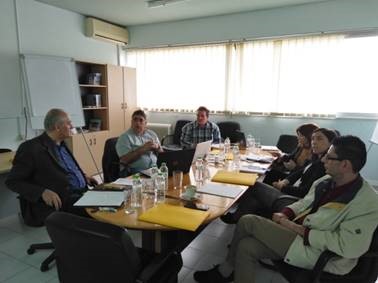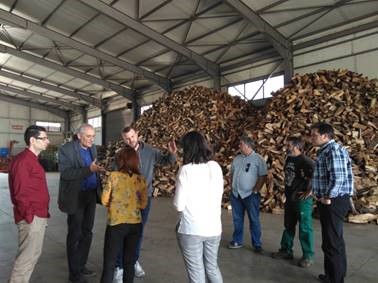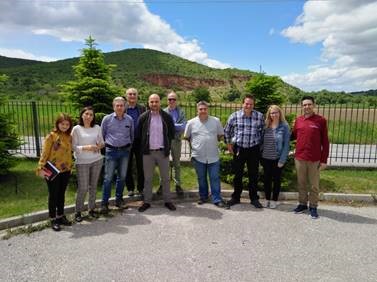Financing biomass projects: Sharing the best practice example of the Development Agency of Karditsa (GR)
Author: Anja Gahleitner, OÖ Energiesparverband, Austria/Facilitator
The Development Agency of Karditsa is sharing its expertise on financing and implementing successful projects with the Municipality of Baião (Portugal) and Municipality of Farkadona (Greece). In the context of a four step learning programme offered by the Prospect project, the municipalities are increasing their knowledge and know-how on developing biomass projects, motivating municipal companies and innovative financing schemes. +Mentors' Corner
Two online sessions allowed the group to gain first insight on the mentor’s experience and on the mentees’ needs and objectives. During the first session, that took place on the 3rd of April 2019, the mentor, Vasileios Bellis, presented the "Establishment and Support of the Energy Cooperative of Karditsa (ESEK)", which was the first collective effort at country level for exploiting forest and agro-biomass. This was followed by a presentation on the Establishment of a Guarantee Financial tool in Greece.
During Step 2 of the Learning Programme and on the 24th of April 2019, a second online session took place. During the session representatives from the municipality of Baião presented first ideas for transforming the local forest biomass in Baião (forested area: 68%) and the nearby municipalities. The Municipality of Farkadona, located in one of the main livestock-farming regions of Greece, presented a potential project to convert livestock sub-products to electricity.
The Municipalities of Baião and Farkadona visited Development Agency of Karditsa to learn about best practices for exploiting Biomass
The physical meeting took place in the City of Karditsa in Greece, on May 6th and 7th 2019.
<
Image: Mentor Vasileios Bellis, General Director of the Development Agency of Karditsa; Petros Kakouros, Forester; Yannis Kazogou , Professor from the University of Thessaly; Dora Pinto and Aida Ribeiro, Municipality of Baião; Constantinos Asikis, Municipality of Farkadona
During the visit, the partner cities had the opportunity to hear and talk about all steps needed to start and finance successful biomass projects. Site visits allowed the participants to learn hands-on about the biomass supply chain in Karditsa. The first visit took place at the pellet production plant of the energy cooperative company of Karditsa. The plant was commissioned in October 2017 (investment: EUR 498,000, 50 % subsidy) and produces around 7 tons of pellets each day. The visitors had also the opportunity to see the local saw mill, which uses raw material from the surrounded areas (70 % main product, 30 % side product for the pellet production). A visit to the regional biomass centre rounded up the overview of the biomass supply chain. The centre gathers wood material from various sources and divides it into three categories according to quality and type of product (material for the saw mill, for pellet production and for log wood production).
<
Image: Constantinos Asikis, Municipality of Farkadona; Vasileios Bellis, Development Agency of Karditsa; Vasileios Filippou, Director of the Energy Cooperative; Dora Pinto and Aida Ribeiro, Municipality of Baião; Petros Kakouros, Forester; Vasileios Vrondos, Owner of the Biomass Centre; Yannis Kazogou, Professor from the University of Thessaly
<
The knowledge and know-how gained during these visits offer valuable input for the mentees’ in the further development of their projects.

Replication/Transferability
The 4th and last step of the Programme took place on the 21st of October 2019 and included an online session dedicated to the assessment and evaluation of the peer learning activities.
Detailed action plans were submitted by the mentees, in light of the new-acquired knowledge gained from the mentor. Conditions for success and key parameters that could affect negatively the plans were also identified, along with a benchmark survey that encapsulated all the outcomes of the learning group.
Rethinking the financing scheme:
Main impressions and understanding about the financing scheme:
This learning program has allowed us to increase our knowledge about the best practices in the scope of exploitation of the biomass energy potential, as well as the possible forms of financing for the realization of projects within the same scope. Especially the physical visit allowed us to contact with the reality implemented, the difficulties, the steps and the success factors. This is particularly important to gauge needs and ways of filling them in the implementation of any project.
- representative of Baião
In the frame of the seminar, I had the opportunity to learn about the successful implementation of a renewable energy project, the construction of a reliable funding scheme, as well as the conditions and the practices in some other country.
- representative of Farkadona
Key project implementation drivers:
- Governance related efforts.
- Technical capacity.
- Communication with all stakeholders and citizens.
- Legislative/regulatory framework.
Key project implementation barriers:
- Time needed for implementation.
- Level of own prefinancing required.
- Staff availability.
Key steps to set up or develop the financing scheme:
- Establish a communication channel with the Local Action Group, the local authorities and the local civil society.
- Investigate if Regional Operational Plans include any motivation for RES or especially for biomass use.
- Explore if the local banks offer special services or products in favor of the enlargement of RES use.

